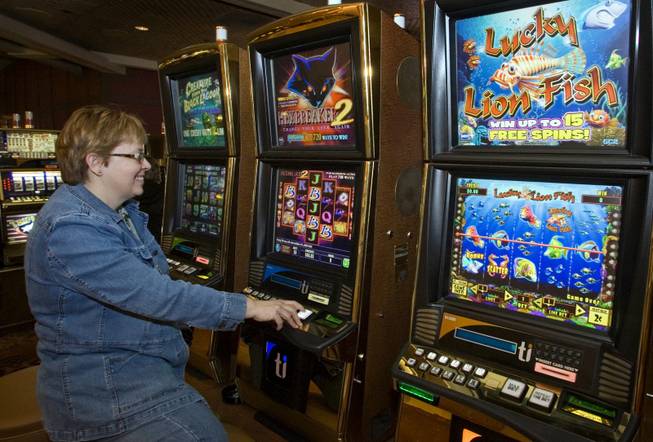
Barb Perrone of Tucson plays a server-based slot machine at Treasure Island on Feb. 8. Regulators met in Las Vegas to discuss how to regulate the machines.
Sunday, Feb. 17, 2008 | 2 a.m.
Beyond the Sun
Nevada casinos are moving toward new technology that will allow managers to change the look, price and take of slot machines from a central computer. But before converting, the industry needs to convince gamblers the new system won’t cheat them by allowing a central office to snatch away looming jackpots at the last minute.
For the millions of people who play slots, the notion that somebody in a back room could change something about their machine without their knowing it could be a confidence killer for the integrity of the game.
“The player perception is, ‘They changed the game just as I was getting ready to win a jackpot,’ ” said Faisal Khan, a technical compliance manager with New Jersey-based Gaming Laboratories International.
The technology, known as server-based gaming, enables casino floor managers to make changes to slots from a central computer that functions as a server for several machines. With a few keystrokes, a manager can change denomination, percentage hold and appearance.
The easy changes will enable casinos to take advantage of different demographic mixes on different days of the week or at different times of the day. For example, a gaming floor may have a preponderance of nickel slots that attract low-budget players on weekdays, but those same machines could be modified to quarter slots for a higher-spending demographic on weekends or at night.
Developing policies and regulations that dispel perceptions about server-based gaming was the primary reason gaming regulators from around the world gathered recently at the Tuscany for a roundtable and conference sponsored by the gaming lab.
Regulators heard from gaming lab experts, machine manufacturers and Missouri regulators who already have server-based gaming in their jurisdiction. Nevada regulators are getting ready for the day late this year or early next when the technology starts arriving on casino floors.
Blaine Preston, gaming enforcement manager of the Missouri Gaming Commission, said that so far, a system at the Ameristar St. Charles riverboat has worked flawlessly. “The reality is that most consumers, the people playing the machines, can’t tell the difference between a game on a server-based system and an existing slot machine,” Preston said.
The Nevada Gaming Commission recently gave its approval for MGM Mirage’s Treasure Island to conduct a field trial of a server-based system. Once the trial is completed, the system could be licensed and available for use statewide.
Steve Zanella, vice president of slots and entertainment at the MGM Grand and the overseer of the parent company’s server-based gaming program, concurs that most players won’t see the difference between the upgraded slots and everything else on the floor.
Zanella won’t say how the Treasure Island trial is going, but he said “nothing out of the ordinary” has occurred. Thirty-two slots on the casino floor are driven by a server.
Although Treasure Island is watching how consumers interact with the machines, the main purpose of the trial is to determine how the technology performs.
MGM Mirage led the previous major technological advancement on the casino floor, becoming the first company to transform all of its Strip floors to ticket in, ticket out technology. When that was introduced, the public didn’t like it, Zanella said. Now most people embrace it, and he thinks the switch to server-based gaming will play out the same way.
Before Treasure Island placed a server-based system on the floor, Nevada had to develop its own set of rules for its operation. One key regulation from the consumer perspective is how to notify players when a change is imminent.
Nevada decreed that machines could be changed only after four minutes of inactivity: “The presumption is that the player has physically left the machine,” state Gaming Control Board member Mark Clayton said.
After four minutes, a message would appear on a screen indicating the machine is being serviced. When the changes are complete, the message clears and the machine is available for play.
Missouri also allows modifications on server-based games after a period of inactivity, but the changeover is a little easier there because regulations prohibit casinos from being open around the clock and changes can occur when the casinos are closed.
The manufacturers of server-based systems said other changes would arrive as they become more mainstream.

Join the Discussion:
Check this out for a full explanation of our conversion to the LiveFyre commenting system and instructions on how to sign up for an account.
Full comments policy